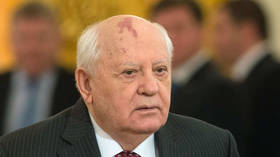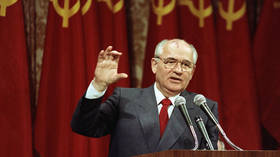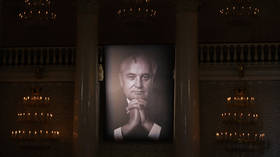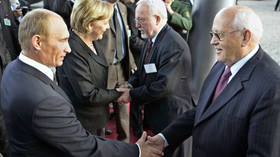Ivan Timofeev: What Russia, and the world, can learn from the failures and successes of Mikhail Gorbachev

Mikhail Gorbachev’s death caused a surge of debate on the political legacy of the USSR's only president.
As expected, opinions were split. Negative comments focused on the Soviet Union’s dissolution, the consequences of which still affect us, for example, in the conflict with Ukraine.
However, positive assessments emphasized unprecedented democratization, the beginning of the transition to a market economy, a sharp reduction in the risk of conflict with the West, and global integration.
For some people, Gorbachev was a symbol of a superpower’s collapse, while for others he was a reformer, who paved the way to liberation and freedom. Unlike the majority of Soviet and pre-revolutionary Russian leaders, who died either in power or as a result of losing it, Gorbachev lived a long and comfortable life after leaving his post. However, he still remains probably the most tragic figure among figureheads in Moscow or Saint Petersburg. A vigorous orchestrator of long overdue reforms, he eventually lost control over them and failed to prevent a quick and inevitable catastrophe.
When studying the experience of Gorbachev’s leadership, people are tempted to suggest what they would have done differently. They are sure that they would not have allowed the country to collapse, or that they would have carried out reforms with a tougher, more hard-core approach.
Given this thinking, ruling a country might be likened to a sort of a computer game – something like a step-by-step strategy or even a real-time puzzle. Here’s one goal and here’s the next. Here we have raw materials, factories, food, and a population. Here are our rivals, and there are our allies. You can introduce a cheat code and receive an endless supply of money and resources. You can also save the game at a crossroads and then replay it in case of a setback. Finally, you can put it on pause, take a break, or simply forget about it. Few gamers can maintain their initial strategy in one go without saving it at some point or using other trickery.
But politics is not a computer game. Gorbachev was destined to take on what was not a pleasant mission. Strictly speaking, he had to pay the bills and loans that had accumulated in huge amounts by the start of his rule. The need for change was obvious even to hardcore conservatives. The Soviet Union was no longer able to carry out a modernization reminiscent of Stalin’s breakthroughs in the 1930s. The country did not have the demographic strength, nor could it use terror and reprisals like before, nor again was there a comparable level of outside threats.
There was an abortive attempt to liberate society in the 1960s. Then, during Leonid Brezhnev’s rule, the country fell into a blissful stability. Contemporaries still recall this period with nostalgia, especially after the shock of the 1990s. But this stability had a price – renunciation of structural reforms in the economy and in the political system, which was fraught with the risk of losing control of the situation.
By1985, the Soviet Union was faced with several fundamental challenges at the same time. For all its enormous scientific and technological achievements, the economy was stagnating and increasingly dependent on the export of natural resources. Administrative efficiency was in rapid decline. It was degenerating into mismanagement, major shortages of everything, and increasingly lagged behind the West.
Attempts to bolster the economy through administrative strategies – from catching idlers to using the free labor of conscripts and Young Communist League members – failed to produce the desired results. The political system began to be dominated by once tough leaders, who were becoming elderly. Standing behind them was an outwardly conformist but increasingly corrupt state and party apparatus. Society was being eroded by cynicism, a combination of feigned loyalty and informal nihilism, comprehensive alcoholism and universal larceny. The gap between the true grandeur of national achievements and the country’s decline in everyday life was staggering. The situation was aggravated by the Cold War, enormous defense spending and support for freeloaders all over the world, who said the right words but betrayed the USSR at the first opportunity.
What could be done about these countless problems? How could they be sure their resolve would not sink under the weight of an indifferent bureaucracy? How could they prevent the system from overheating and causing them to losing control over the domestic situation?
It is not easy to respond to these questions even now, knowing what has happened. If it were possible today to restart this era as a saved game, would we be able to replay it with success? And how should it be replayed? With another round of stagnation? By launching an authoritarian modernization? By resorting to reprisals? Or by starting up an uncompromising democratization again?
And, one more question: What forces or people should we replay this saved game with? We can only use the people who lived in those times, with their limited capabilities and their own picture of the world. This applies to Gorbachev himself, a product of this very system. He was an exemplary hero, a self-made man from a lower social stratum. He climbed the steps of power from the provinces.
The reality is that the country had to be reformed using its own potential, with all its accumulated ulcers and diseases.
It seemed obvious to start with the economy without touching the political foundations at first. The attempt to reduce the burden of the confrontation with the West in a controlled mode looked equally correct. In the final count, glasnost (openness) and the radical shake-up of the party apparatus seemed an obvious proposition as well. Otherwise, the reforms would have turned into a bubble that rose and then burst on the water surface of a swamp, returning the country to its rotten and pernicious tranquility. This was how the feverish and ill-conceived reforms of Khrushchev’s Thaw died out.
In all probability, several factors contributed to the loss of control over the situation. To begin with, Gorbachev fell hostage to his own humanism, his unwillingness to use reprisals, and a tendency to seek compromise. Having realized this, a host of diverse players began testing his strength. Was it possible to promote the idea of a “common European home” while brutally crushing the emerging opposition movements in the socialist camp? Could they use force to suppress Budapest, Prague, or Warsaw? Was it possible to respond with tanks to the fall of the Berlin Wall? This could be done, of course. But it was also likely that such actions would only have expedited the self-destruction of the system. The testing of red lines was gradually becoming more resolute.
There was a riot in Vilnius. Force was used, but a whirlwind of protests could not be stopped without great bloodshed. Ethnic conflicts started flaring up, one after another, in the South Caucasus. Boils were bursting in Central Asia. Ukraine was drifting towards independence, with its nomenklatura increasingly aware of the opportunity to take power into its own hands. Eventually, the RSFSR (Russian Soviet Federative Socialist Republic) itself came to lead the process of disintegration. Boris Yeltsin was very skillful at exploiting Gorbachev’s reluctance to use force. Later, Yeltsin himself was not ashamed to fire at the parliament building, send troops to rebellious Chechnya, or establish a super-presidential republic. It is likely that in so doing, Yeltsin managed to stop the disintegration of Russia itself. But the Soviet Union and its political structure collapsed overnight, by historical standards. It was not saved by the nomenklatura, the secret services, the multimillion-man army, or one of the world’s biggest political parties.
A much deeper neglect of economic and administrative problems and any opportunity for reform was another factor in the dissolution of the USSR. The informal sector and top-to-bottom corruption interfered with the implementation of any formal plans. They were only seen as a talking shop and demagogy, an imitation of actual activity, and a chance for milking the budget. All the demons of the 1990s – in the shape of a raw-materials economy, corruption and rampant lawlessness – had slowly been brewing for several decades and finally fermented by the mid-1980s. The beginnings of a market economy and democracy gave the corrupt elites a chance to privatize their power and privileges. They became the main beneficiaries of the USSR’s disintegration.
Gorbachev happened to be at the worst crossroads of challenges and threats in the process of historical change in Russia. Unlike Tsar Nicholas II, who was afraid of political reform, clung to old ways, was estranged from people, and who became entangled in unfortunate wars, Gorbachev initiated reforms himself and was unprecedentedly close to the people. He tried to finish wars and develop relations with the outside world. But he lost the country, for which he would be blamed for many years to come. He did, however, avoid bloodshed, at the time, that would have been comparable to events in Yugoslavia in the 1990s or the Civil War in Russia in the early 20th century. Our society has rarely had such a deep breath of fresh air as during Gorbachev’s rule. But Russia has never experienced such a deep decline, despite its enormous resources.
New generations must not forget Gorbachev’s record. On the one hand, they must be conscious of the dangers of overwhelming corruption, the chasm between society and the powers that be, and total dissimulation. On the other, they must not forget the abuses of reform, excessive trustfulness, and the lack of toughness, when needed.
Gorbachev is part of our history, a symbol of a major turning point, who left important lessons for us. Our ability to understand them will largely determine the future of Russia, which has many trials ahead.
The statements, views and opinions expressed in this column are solely those of the author and do not necessarily represent those of RT.















